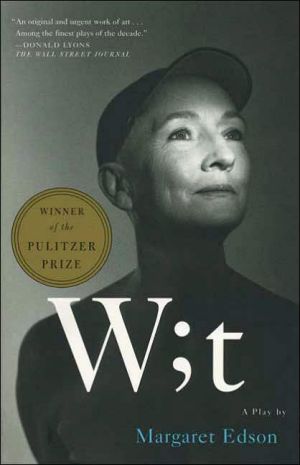

 |

|

The average rating for Wit based on 2 reviews is 2.5 stars.
Review # 1 was written on 2011-11-17 00:00:00 William Rafferty William RaffertyA moving Pulitzer award-winning brilliant play by Margaret Edson (born 1961). A dying highly respected poetry professor specializing on John Donne works. The professor is diagnosed with stage 4 (there is no stage 5) ovarian cancer and she is expected to die in few days. The play chronicles her last few hours on earth. She is visited by her former professor who offers to read her a John Donne poem. She declines so her visitor pulls out a children's book she just brought for her great-grandson's birthday: Margaret Wise Brown's The Runaway Bunny. The reader will easily spot the connection of the poem to the one the professor's father read to her when she was a young girl: Beatrix Potter's The Tale of Flopsy Bunnies that made me her interested on the reading. When she learned the power of words. When she learned that soporific means inducing or tending to induce sleep. On her last few days on earth, the professor analyzes her life especially the use of wit through the metaphysical poems of John Donne. I had to look up the meaning of wit in metaphysical poems and I did not know who John Donne was and that's the beauty of reading: you get to exposed to more things and learn new things in the process. So, I held on. "Wit" is a form of intellectual humour and a wit is someone skilled in making witty remarks. Forms of wit are the "quip" and "repartee." So, in the story, it is still the professor, Vivian who is the wit and she is still able to make some funny remarks to the other characters or in her thoughts. However, the irony of it all is that there is no one visiting her as she has no known relatives (orphan, single, childless) and no friends (career-oriented) at school. The play is another eye-opener in terms of what is really important in one's life. On one's last day on earth, nobody has ever said: I wish I had spent more days in the office. Me as a wit: What if on my last day and I say this, will I be put in the Guinness Book of Records and will people stop uttering this much-used sentence? The play is short. One-act. One continuous setting: hospital. It used and Edson probably believes this one Shakespeare line (that of Polonius in Hamlet) that I knew since many years back: Brevity is the soul of wit. Me as a wit: So I am keeping this review short. |
Review # 2 was written on 2016-02-01 00:00:00 Joel Killen Joel KillenI am going to refrain from giving this stars (a practice I am trying out.) There are already some really good reviews on gr. I am not going to thoroughly review the play, but I do want to say a bit about my ambivalent response. This is a play narrated by a woman dying of metastatic cancer. Before getting sick she was a hard-core academic and her focus was 17th century poetry, particularly John Donne. She has very little access to emotional connection. She intellectualizes just about everything. And before getting sick, she was uncompromising and inflexible. Moreover, it seems she had zero friends. What I think both makes this play work and also, at the same time, kind of unravels its power, is the structure. There are a lot of echoing themes. The Bunny books by Margaret Wise Brown. The poetry of John Donne. Vivian's emotional spininess. The doctors' coldness and the nurse's warmth. They sort of produce an emotional reaction, but I found mine fizzled out into a bit of frustration. Basically, while I appreciate very much that this play addresses the utter failure of doctors to treat patients compassionately, and while I appreciate the ways that it tries to explore the question of institutional expectations versus human connection, I also find it relies too heavily on stereotypes and formal repetitions. It's a little like I'm been force fed my peas and carrots. Moreover, and more importantly, I was really freaking icked-out by the whole nurse being the intellectually inferior but emotionally care-takey character. My biggest fear, reading it, was that someone would cast the nurse as the wise black female archetype whose job it is in American cultural productions to emotionally support the poor old white woman and serve as a bridge to her emotional world. And, well, I looked at the movie cast just out of curiosity (while writing this today -- I read the play yesterday) and what do you know, that's exactly what happened in the film version. Ugh. Maybe I would find this play a little more tolerable if the casting were to undermine some of the banal crepe. How about cast a woman of color as Vivian. Have the nurse be a white guy. (A boy named Sue.) I don't know. But as things are, I'm not so excited about the play. That said, I am glad I read it. And glad I read the reviews of some folks who really liked it. Who felt comforted by a play that spoke to their experiences of loss and illness. And reading the play reminded me of how much I enjoy reading scripts (plays, film scripts) and writing them, too. So, this play is a mixed bag. There are things to admire in it and many things, also, to rail against. And so I do both. And prepare to read some plays by Mishima. And this is where my review ends. |
CAN'T FIND WHAT YOU'RE LOOKING FOR? CLICK HERE!!!